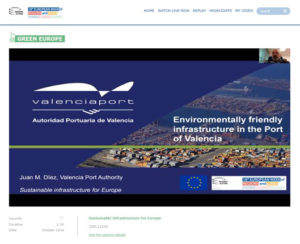
Valenciaport has been invited to the “Sustainable Infrastructures for Europe” panel of the 18th European Week of Regions and Cities
Juan Manuel Díez Orejas, Head of Strategic Planning and Innovation (PAV), explained the process of implementing environmentally friendly infrastructures in Valenciaport
València, October 25th, 2020.- The Head of Strategic Planning and Innovation of the Port Authority of Valencia (PAV), Juan Manuel Diez Orejas has assured that “the new port infrastructures require sustainable state of the art terminals to face global challenges. At Valenciaport, all our projects, in their different phases of planning, tendering, construction and operation, are subject to rigorous environmental control and monitoring because we want to be a reference point as sustainable ports and to fulfil our commitment to 2030, zero emissions”.
The Head of Strategic Planning and Innovation of the PAV participated in the digital meeting “Sustainable Infrastructures for Europe” in which Luc Rens, Director General of the European Association of Concrete Pavements, Veronika Safrankova, also took part, Head of the Office of the United Nations Environment Programme (UNEP), Suzanne de Vos-Effting, adviser to the Netherlands Ministry of Infrastructure and Water Management, and moderated by Katharina Knapton-Vierlich, Head of Unit of the European Commission.
During his speech, Díez Orejas exemplified Valenciaport’s commitment to sustainable infrastructure with the new North Terminal and the new Passenger Terminal projects. “For both projects we have included in the tendering phase requirements that these facilities must meet, which are focused on creating ecological, intelligent and accessible terminals that combine the generation of wealth and employment with respect for the environment”, she said.
Thus, among the requirements of the PAV for this type of infrastructure is included, in the tender document, an environmental plan that contemplates a commitment to the development of Ecoport’s environmental management systems (EMAS), an environmental protection programme for the construction phase, specific measures to reduce CO2, the use of renewable energies, recycling or the use of eco-efficient machinery and equipment, among other measures.
Green terminals
The project presented by TIL for the new North Terminal of the Port of Valencia is designed to minimise CO2 emissions and energy consumption. Thus, it has measures to promote railway intermodality, it will be fully electrified for the supply of ships, 98% of the machinery will use electricity supply, 100% of the energy will come from renewable sources. Also, the automation of the equipment, the use of advanced traffic prediction systems, the design of the buildings with energy efficiency criteria, and the external lighting system with LED-type luminaires, will make it possible to minimise energy consumption.
In this line, the new Passenger Terminal project presented by Balèaria will have 100% of the energy coming from renewable sources, the recycling of waste recovered from the ships and the maritime station for the production of biofuels, the electricity supply network for the ships at berth, the design of the roofs of the buildings for the installation of photovoltaic solar panels or the protection of the historical and cultural heritage of the buildings.

